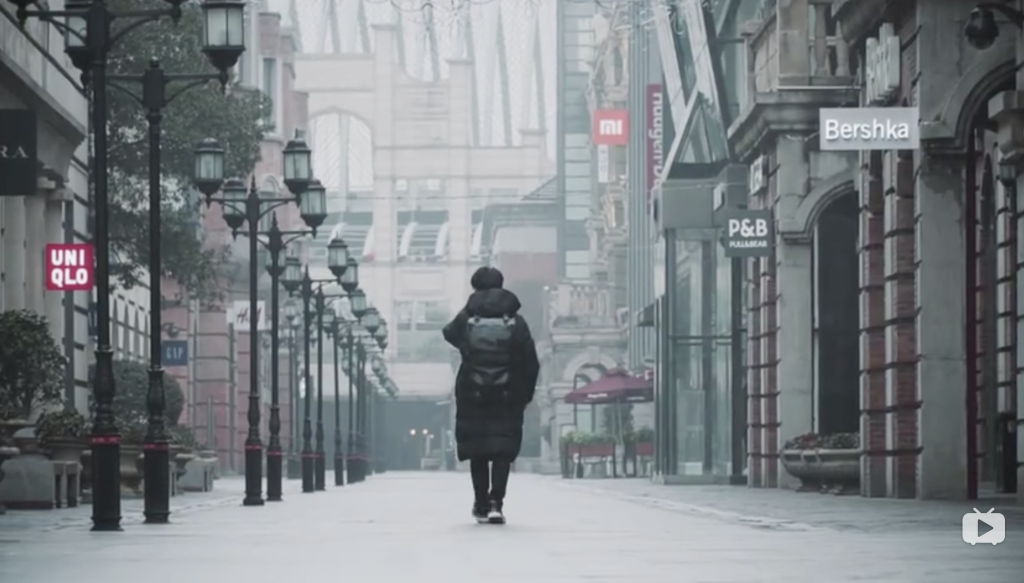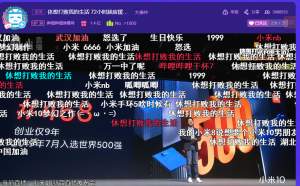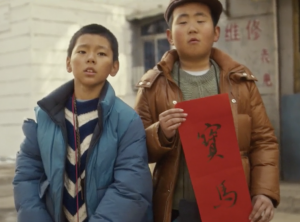
Lin Chen’s Bilibili videos from Wuhan have drawn millions of views
The far-reaching impacts of the novel coronavirus outbreak will touch just about every part of the Chinese economy as well as consumer behavior. With a significant part of the population confined to their homes as they wait out the spread of the epidemic, internet-enabled connections to the outside world have played a crucial role across sectors, and the experience may change how content is consumed well into the future.
Movies
China’s film industry, already under pressure from slowing box-office growth, government censorship and declining investment, has been hit hard by the coronavirus, which prompted the cancellation of all new releases and closure of theaters across the country right before the start of the busiest moviegoing period of the year.
With the coronavirus showing few signs of abating, theaters remain closed, filming activity has ceased and new releases planned around Valentine’s Day have been shelved. So far, only two planned theatrical releases have gone straight to streaming, and prospects for recovery look very uncertain.
The online movie industry has a long way to go before it can serve as a viable substitute for theatrical films. During the first week of the Spring Festival, iQiyi, Youku and Tencent Video released 18 new films online, with iQiyi accounting for half of the total, but none of those films enjoyed breakout success.
Television
TV broadcasts have seen bigger-than-normal ratings boost even as authorities ordered networks to to add programming on the outbreak and cut back on entertaining content. Viewership was up more than 22% during primetime hours compared to the 2019 Spring Festival holiday period.
In the long term, networks may also suffer from the slowdown in production, and have already lost several popular shows that were scheduled to air during the Spring Festival period, although these are likely to air at a later date.
Among the major networks, Hunan TV has taken creative measures to salvage some of its content. On its popular talk show “Day Day Up” (天天向上), celebrity hosts conducted the show as a livestream from their homes. The virus was incorporated into the discussions with a trivia question on the origins of the face mask and the winner chose a medical organization to donate a prize of masks. It also adopted a similarly improvised format for a concept tied to its cancelled talent show “Happy Camp” (快乐大本营), with hosts and guests participating via video conference.
The outbreak has increased interest in medical content, with the 2017 drama series “Emergency Physician” (急诊科医生) making a comeback on satellite networks and streaming video sites as it trending on Weibo for its storylines involving a coronavirus and quarantines. However, the popularity of medical dramas may be short-lived rather than a sign of future trends, as the genre has not performed very well in China compared to market such as the U.S. and Japan.
Video streaming
China’s video-streaming services operate with relatively fewer constraints than traditional broadcasters, though they too are required to feature coronavirus content across their platforms and will also be affected by the ongoing ban on new productions — however that could give a second chance to their large backlogs of unaired inventory.
The documentary series “The Chinese Doctor” is another previously aired medical program that has found success via streaming: After airing four episodes on CCTV last year, it was was recently picked up by iQiyi and released in its entirety. Documentary programs may see bigger long-term gains than medical dramas. Already, a series has been filmed covering how Shanghai doctors are being trained to handle the crisis and awaits editing.
There has been a surge in demand for documentary-style user-generated content, and that’s been a boon for streaming video platform Bilibili and its well-established community of creators. Among the most popular is the vlogger Lin Chen ( 林晨同学), who has been sharing dispatches of his daily life in Wuhan along with reports on the city’s hospital situation, racking up millions of views for his videos.
Short video
Unlike in the United States, where TikTok is largely the province of teenagers and dance videos, Chinese counterparts such as Douyin and Kuaishou have long enjoyed broader audiences and a greater diversity of content. That difference underlies the key role they’ve played as both entertainment outlets and sources of information during the epidemic.
Short video platforms established dedicated channels and hashtags for updates, encouraging users to make donations through their e-commerce-enabled apps and developing additional programming.
Bytedance also helped make movie industry history when it bought the rights to stream Lunar New Year film “Lost in Russia” across its platforms, including Douyin, Xigua Video and Jinri Toutiao, marking the first time a Chinese studio film premiered online. ADD CBI LINK
In addition to professional content, short-video platforms have gained additional traction for featuring amateur video from the front lines of the fight against coronavirus (particularly footage of medical workers) and as sources of “home entertainment” — viral short-video content about how ordinary citizens are passing time during their mandatory “staycations.” Downloads of short-video apps have surged as a result.
Gaming
Interest in mobile gaming rose sharply during the first week of the Spring Festival holiday, with the majority of respondents in one survey choosing to spend their free time playing video games. Data from SensorTower showed iOS app store downloads up 27.5% year-on-year during the holiday week. Among the big winners are Tencent’s Honor of Kings, with daily active users up as much as 50%, and the pandemic modeling game Plague Inc.
However, esports are taking a hit as major live tournaments are being postponed, and game console manufacturers are expecting delays in production.
Music
A number of Chinese celebrities (many of whom play multiple roles as singers, actors and influencers) have appeared in bare-bones music videos to add their voices to the coronavirus fight. Singer Lay Zhang added an interactive element to his music game by inviting his fans to help write lyrics for a song he is working on titled “It Will Be Fine“ (会好的).
Meanwhile, live music events are another obvious no-go, but at least one major festival organizer opted to take its show online. Indie music label Modern Sky, which runs the Strawberry Music Festivals, launched a five-day series of broadcasts on Bilibili called “Stay at Home Strawberry,” which included performances from its previous events around the country, videos created by musicians, and livestreams of artists at home engaging in activities such as exercise or cooking. Peak views of the February 5 stream reached over 480,000, and the events used Bilibili’s bullet chat features to create a sense of community around the streams.





